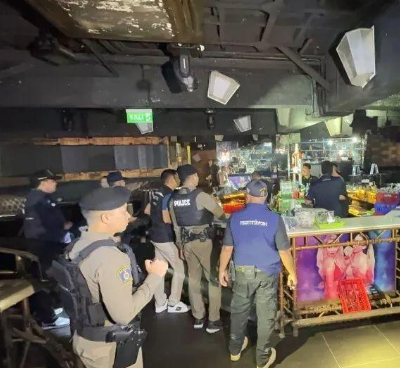Breaking! Thousands of Tourists “Stranded on the Streets” as Shops Across Thailand Close!
That evening, a large number of tourists were “stranded on the streets,” visibly shaken by the experience.
Pattaya, a world-renowned hub of revelry, saw its entertainment venues and alcohol service establishments shut down city-wide, leaving no place for visitors to enjoy.

The scene was like something out of a time warp: a “ghost town” visible only to tourists.
Fortunately, the on-duty police provided an explanation that night.
Pattaya police had forcibly closed bars and entertainment venues, leaving thousands of tourists “stranded on the streets”!
February 24 marks the annual traditional Buddhist festival in Thailand, the Makha Bucha Day, a Thai national holiday, leading to a 3-day long weekend from February 24-26. Every year, on the eve of Makha Bucha Day, Thailand issues a reminder of the alcohol ban, and this year was no exception.
On February 23, the Royal Thai Police issued a reminder that for the entire day of Makha Bucha Day, from midnight of February 23 to midnight of February 24, the sale of alcoholic beverages was prohibited nationwide, except in duty-free shops at international airports. Violators could face up to 6 months in jail, a fine of up to 10,000 Baht, or both.

According to Pattaya media reports in the early hours of February 24, to strictly adhere to the national police’s “24-hour alcohol ban on Makha Bucha Day” directive, Pattaya police forcibly shut down local bars and major entertainment venues, including the famous Pattaya Walking Street, just after midnight on February 23. This led to thousands of Thai and foreign tourists wandering the streets late at night. Some tourists were puzzled by the police’s actions, but after proper negotiations with the police, they came to understand and accept the measures.
Thailand, which welcomes people from all over the world to settle and travel, is a melting pot of various cultures, but its underlying essence is always “Buddhism.”
It is understood that during traditional Buddhist festivals such as Makha Bucha Day, Vesak Day, and Asalha Puja Day, Thailand generally enforces a ban on the sale of alcohol.
ThaiNet reminds foreign tourists traveling to Thailand to respect local religious customs.
However, why has the “alcohol ban” been especially strict since 2024?
It all stems from the Saettha government’s rigorous stance.
Bangkok’s population density has reached very crowded levels.
During the Buddhist festivals, when the population gathers, any alcohol-related disturbances could pose a significant social risk, with those around the intoxicated individuals becoming innocent victims.
Thus, the ban on alcohol addresses two major issues:
First, it prevents disturbances caused by alcohol consumption;
Second, it ensures the safety of tourists.
Moreover, as Thailand is a Buddhist country, temples naturally have precepts and restrictions regarding “alcohol.”
Saettha’s adherence to “soft power” and the unity of security work is evident in this regard.
Thus, the nightlife’s bright lights and revelry must compromise and bow to this solemn tradition.
This slow-paced life, seemingly free, is subservient to a faith that transcends everyday life.
There’s always a line, forming the baseline of a community unified in spirit—this is Thailand.
The only ones disappointed are foreign tourists unaware of this regulation.
Furthermore, all 7-Eleven stores across Thailand stop selling alcohol after midnight Bangkok time.
Some “foreign drunkards” express their dissatisfaction through extreme behaviors such as vandalizing stores and assaulting people, but Thailand has not budged on this regulation.
The nightly revelry under the moonlight does not indicate Siam’s hospitality but rather, the wandering of thousands of tourists in a deserted city highlights Thailand’s genuine commitment to safety.
In the face of life safety and revenue generation, Thailand has not hesitated to prioritize the safety of its visitors.
It hopes that every traveler from afar can understand this heartfelt sincerity.